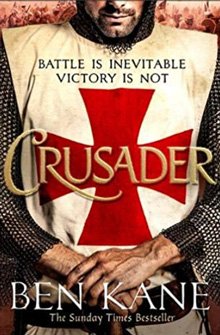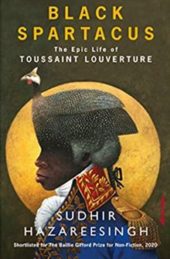
Richard Foreman
Robert Tombs produced one of the finest history books of the last five years, in the form of The English and their History. I am suitably looking forward to his new book, This Sovereign Isle: Britain In and Out of Europe. It will no doubt be full of argument and insight. There may be some people who will not like what he has to say, but that is all the more reason for them to read it.
On the historical fiction front there is Ben Kane’s Crusader, which deals with Richard the Lionheart and the Siege of Acre. It’s a great story from history, which will be told with great aplomb by one of our best storytellers.

Helen Fry
I am looking forward to the new novel by Charlotte Philby, The Second Woman, in part a fictional account of grandfather Kim Philby‘s friendship with Soviet spy Edith Tudor-Hart. The trailer is gripping: Two women are found dead. Both had a secret. Both had a choice. 2021 promises to be a year of interesting espionage literature, including another must-have new book for the shelf by Biographer and journalist Anne Sebba. Her new research focuses on the tragic life of the Cold War spy in Ethel Rosenberg: A Cold War Tragedy. Rosenberg became the first woman to be executed in the US in almost a century on charges of other than murder. Her high profile case became one of the most infamous spy cases in US history and a miscarriage of justice. What is most shocking is that she was just 37 years old and the mother of two young children. Both books promise to attract an international readership.

Cristopher Joll
The Ottoman Empire 1700-1918 by Virginia Aksan, to be published 15th February 2021. It is the popularly-received wisdom that the current instability of the Middle East is the result of the post-World War One self-interested dismemberment of the Ottoman Empire by the victorious French and the British. However, whilst the division of the Levant was (for the most part) agreed in advance by Messrs Sykes and Picot, their seemingly arbitrary lines on the map of the area were in fact determined by hundreds of years of regional history. This, in turn, was dominated by the control exercised over its Middle Eastern empire by the Sublime Porte in Constantinople. Authoritative histories of the Ottoman Empire, which can inform the situation today, are thin on the ground – so I greatly look forward to Ms Aksan’s upcoming book on the subject.

Keith Lowe
A whole slew of books about Covid will be coming out in 2021 – and I shall maintain strict social distance from them. Peter Osborne’s Assault on Truth, an exposé of Boris and Co.’s persistent fibbing, will be quite depressing enough, thank you. To cheer myself up I intend to read Everything You Need to Know About Politics by Jess Philipps – a rare politician who, whether I agree with her or not, at least seems human. The day job requires that I read Judy Batalion’s The Light of Days, a potentially important history of Jewish women who fought back during the Holocaust. But for pure pleasure, I can’t wait for David Sedaris’s second volume of diaries, A Carnival of Snackeries, next October.

Robert Lyman
I’m looking forward to reading Nazis and Nobles: The History of a Misalliance by Stephan Malinowski and Jonathan Andrews. The relationship between the Nazi Party and the German – especially Prussian – aristocracy was a subject that intrigued me when I was researching Under A Darkening Sky (published in the UK as The Rise of the Third Reich. I am persuaded by the argument that the aristocracy supported the Nazis, primarily because of the lure of Gross Deutschland. This was the brilliance in Hitler’s sale’s message – a ridiculous theory of racial exceptionalism was accompanied by a promise to expand Germany’s borders to the extent that German blood flowed. The Slavic lands to the east would be granted to Germany, and Germans would populate their expanded territories. Who else would own and govern these territories but Germany’s natural leaders, the aristocracy?
I’m also looking forward to Sean McMeekin’s Stalin’s War: A New History of World War II. There are few scholars to touch McMeekin on the USSR at war and a reappraisal is long overdue, especially that of how the West sustained Stalin through his most difficult two years – June 1941 to June 1943, and supplied him with war material the USSR could not itself provide.

M.J.Porter
Somewhere in the shadow time between the departure of the Roman legions in the early fifth century and the arrival in Kent of Augustine’s Christian mission at the end of the sixth, the kingdoms of Early Medieval Britain were formed. But by whom? And out of what?
In The First Kingdom, Max Adams scrutinizes the narrative of this period handed down to us by later historians and chroniclers. Stripping away the more lurid claims made for a warrior-hero named Arthur, he synthesises the research carried out over the last forty years to tease out the strands of reality from the myth. He reveals how archaeology has delivered evidence of a diverse and dynamic response to Britain’s new-found independence, of material and intellectual trade between the Atlantic islands and the rest of Europe, and of the environmental context of those centuries.
A skilfully wrought and intellectually probing investigation of the most mysterious epoch in our history, The First Kingdom presents an image of post-Roman Britain whose resolution is high enough to show the emergence of distinct political structures in the sixth century – polities that survive long enough to be embedded in the medieval landscape, recorded in the lines of river, road and watershed, and memorialised in place names.”
Max Adams doesn’t shy away from the thorny issues of Early England, but instead embraces them with a style unique to him, and all the more gripping for it. Combining history, archaeology and not a little imagination, he has already shared the story of Northumbria’s Golden Age, and Britain in the time of Ælfred (which I highly, highly recommend, especially for fans of The Last Kingdom books by Bernard Cornwell), and his new book, The First Kingdom, is sure to be equally enthralling.
The name of Arthur is enough to conjure wonderful ideas of the legend, but in his new book, Max Adams promises to wade through the thorny issues of the source material, combining it with the advances in archaeology in recent years, and I am sure it will be as magnificent as his previous two books on Early England. The conclusions that he draws will be tempered with his wisdom and ability to admit when he’s presenting his own ideas and when he’s informing the reader of the current thinking, a style I find unique to the author, and all the more refreshing for it. After all, so little is ‘known’ about this time period, it is right to be cautious. I already have this book on pre-order and can’t wait for February to read it.

Andrew Roberts
Lucasta Miller’s biography, Keats: A Brief Life in Nine Poems and One Epitaph will, I suspect, be one of the literary highlights of 2021. The author of the acclaimed books The Bronte Myth and L.E.L.: The Lost Life and Mysterious Death of Letitia Elizabeth Landon, the Celebrated ‘Female Byron’, Miller is a celebrated historical and literary sleuth as well as a writer of scintillating, witty prose. It will be fascinating to see how she approaches the tragically short life of Keats in the bicentenary of his death.

Charles Spencer
I’m particularly looking forward to The Madness of Grief: A Memoir of Love and Loss by Richard Coles, due out in April. The author is a man of rare intelligence and empathy, as his weekly broadcast on Radio 4 makes clear. I can’t wait to read his thoughts on the emotions we must nearly all endure, at some point in our lives – usually, repeatedly, as hammer blows of raw pain. This book was prompted by the loss, a year ago, of his partner, David.

Deborah Swift
The Shape of Darkness by Laura Purcell. I’ve enjoyed two of Laura Purcell’s other books and I know this will be fabulous entertainment. I’ve always been interested in the Victorian art of cutting portraits in silhouette. During the Victorian era, before the advent of photography, silhouettes were a main way that common people could have a portrait made, and even after death silhouettes were created to remember loved ones. In the forthcoming novel ‘The Shape of Darkness’ set in Victorian Bath, silhouette artist Agnes is struggling to keep her business, and things go from bad to worse when her clients start dying. So she asks for help from a child medium with unexpected results.
The Mystery of The Hawke Sapphires by J C Briggs. It was a brilliant idea to imagine Charles Dickens as a detective and to people the novels with Dickensian characters and all the darkness and gloom of foggy Victorian London. This is the seventh book in this well-researched and engaging series, and I’m sure will not disappoint fans of the traditional murder mystery genre. On his deathbed, the sinister Sir Gerald Hawke asks a distant cousin — Reverend Meredith Case — to find Sapphire, his long-lost ward and heir to the Hawke family jewels. Add in a murder mystery on the steps of a bookshop, and Charles Dickens, along with sidekick Inspector Jones, is soon on the case.

Peter Tonkin
I am by no means alone in having upped my total of books read in 2020. Four authors stand out in terms of anticipation for continued reading next year. Captain Richard Woodman’s novellas Cold Truth and Judged By His Peers moved him away from the wooden walled world where he stands shoulder to shoulder with CS Forester and Patrick O’Brien – so any further adventures set in the between-war years would be most welcome, though I note An Absence of Imagination – A Tale of the China Coast has just been released and, on my Kindle immediately, will get 2021 off to an excellent start even though it was technically published in 2020 and is set in the 1950’s, taking it out of the ‘historical’ era. A problem also faced by Janet Roger’s wonderful Shamus Dust set in 1947. Harry Sidebottom’s The Return proved as gripping as the earlier Lost Ten and I look forward very much to the return of Ballista in The Burning Road. But it was Doherty and Turney’s Sons of Rome that trumped them all for me. The interweaving stories of Maxentius and Constantine grips from the first line to the cliff-hanger ending as both heroes see their plans in ruins and their hopes of imperial power snatched away. Masters of Rome is due out on 4th March 2021 and I for one can’t wait!

Steven Veerapen
Valentino Will Die by Donis Casey. The author of the Alafair Tucker mysteries is set to take on the glamour and darkness of early Hollywood, as a director is struck down in the 1920s. I’ve always thought golden-age Hollywood, run as it was by king-like moguls – and currently undergoing renewed interest in film and TV – would be the perfect setting for a mystery.
Now and Then Stab by Anna Castle. The latest in Castle’s line of mysteries starring a sleuthing Francis Bacon is set to cover the intrigue surrounding Christopher Marlowe’s death. These novels are witty, inventive, and always deeply researched.
Master of the Revels by Nicole Galland. The sequel to The Rise and Fall of D.O.D.O. promises to see a daring young time traveler must return to Jacobean England to save the modern world. This is a new and burgeoning genre and it’s wonderful to see it tackle the Jacobean era.
Cities of Gold by Bill Yenne. This exciting nonfiction book will chart the history of fabled cities of gold, from El Dorado to Manoa and more. The mythical origins and fascination that these legends have produced – and continue to produce – promise to make this a must read.
Elizabeth’s Sea Dogs and their War Against Spain by Brian Best. Naval history is always interesting, and no more so than when it was dominated by the big personalities of Elizabeth I’s reign. This nonfiction study of those personalities promises an exciting history of plunder.

Oliver Webb-Carter
David Stuttard’s Greek Mythology: A Traveller’s Guide from Mount Olympus to Troy from 2016, and Nemesis: Alcibiades and the Fall of Athens more recently in 2018 were both wonderful and full of life from far off ancient Greece. In May 2021 Phoenix: A Father, a Son, and the Rise of Athens is published and I’m very much looking forward to reading of Athens’ rise, told through the lives of Miltiades, victor at Marathon, and his son, Cimon, the great general and politician.

Adam Zamoyski
A book I will be greatly intrigued to read is Napoleon: A Life in Gardens and Shadows by Ruth Scurr, which Chatto is due to bring out in May. It sounds like an absolutely batty idea; nothing in my research on Napoleon suggested he had any interest in gardens until, bored and frustrated, he took up gardening in his last years on Saint Helena. And I’m not sure what ‘shadows’ she’s intending to explore. But Ruth Scurr is an intelligent and knowledgeable historian who writes beautifully, so I’m sure she’ll carry it off.
I am also very much looking forward to reading Andrew Roberts’ biography of George III, which I believe is coming out this year. I have always had a soft spot for this kindly and much maligned monarch who had to live through the humiliation of the loss of the American colonies but was denied by his mental disorder the satisfaction of seeing Britain triumphant in 1815. Knowing Andrew Roberts’ meticulous research and powers of empathy, it should be a wonderful read as well as a vindication.




